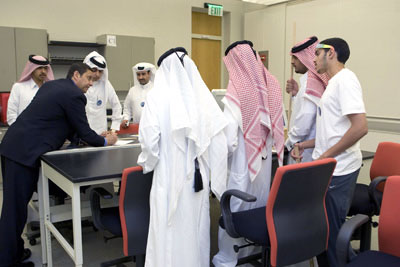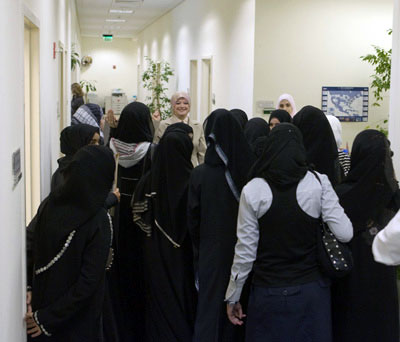Welcoming potential doctors to WCMC-Q
March,2008

A supportive environment: Dr. Imad Makki guided visitors through an
overview of WCMC-Q, from entrance requirements to work in the lab.
WCMC-Q recently hosted visits by students from two leading high schools in Qatar, as part of a bid to reach out to young people who are considering a career in medicine.
18 young women from Al Bayan Scientific School, and eight students from Omar Bin Al-Khattab Educational Complex for Boys, spent several hours at the Medical College on separate days in February. Almost all the visitors were Qatari nationals.
It was their chance to meet faculty members, pitch their questions to Qatari students already enrolled at WCMC-Q, and find out more about what it's really like to study at the Medical College, from the level of English required to how a hands-on session in the physics lab works.
They also met staff in the Office of Admissions and familiarized themselves with the on-line applications system: WCMC-Q has dedicated computer stations for those wishing to make their applications on-site.
The institutions invited to participate are among the most important of WCMC-Q's feeder schools, and Al Bayan School offers a final-year stream for girls intending to pursue a career in medicine.
Welcoming the visitors, senior lecturer in physics and Director of the Foundation Program, Dr. Imad Makki, explained the programs of study, with particular emphasis on how the Foundation Program can help students adjust to the demands they face.

Admissions staff welcomed girls from Al Bayan school and introduced
them to WCMC-Q’s on-line application system.
"What we want them to take away from events like this is that, once they enter Weill Cornell, we will give them all the support we can to help them succeed," he said in an interview. "The field of medicine is not easy, and this is their biggest concern. We want to prove to them that they can do it."
The Foundation Program, introduced in 2007, extends the pre-medical phase by a year for those applicants who would benefit from a longer period of preparation before applying to the Medical Program.
For Khalid Al Saegh, who had already applied to the Pre-medical Program, finding out about the extra preparatory stage made a world of difference: "I didn't know about the program before (I came). When I applied, I didn't think I had a chance. Now, I think my chances are greater."
Identifying the "English language barrier" as potentially the main obstacle to succeeding at WCMC-Q, he added that the extra support would help incoming students to adapt successfully to the challenges.
School counselor, Mr. Saleh Al-Neshwar, said participating in the visit and meeting former pupils who are now studying at WCMC-Q was a useful step.
"The students get to learn about the Medical College first-hand. It's very important for them to hear about the supportive system that helps students to succeed, and to go back and spread the word. When they see how students from the same school have made it to the Pre-medical and Medical Programs, it takes away some of the concerns they have."
Report by Sylvia M. Ismail
